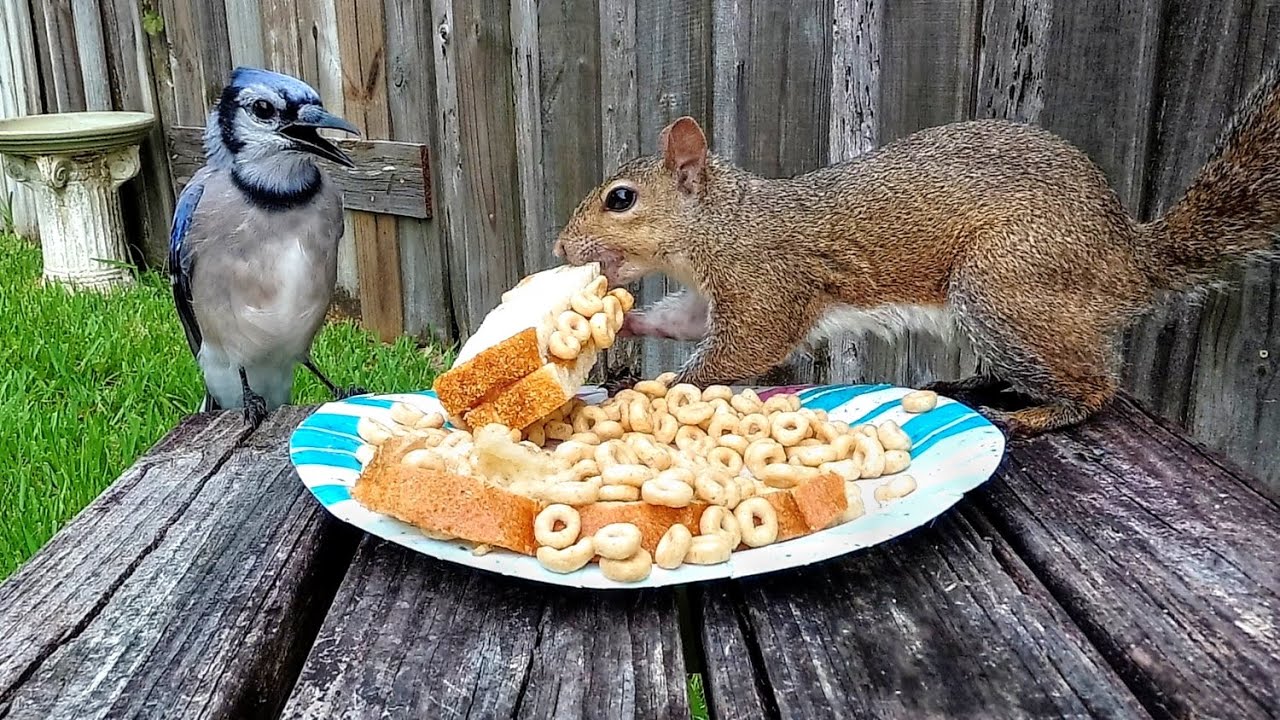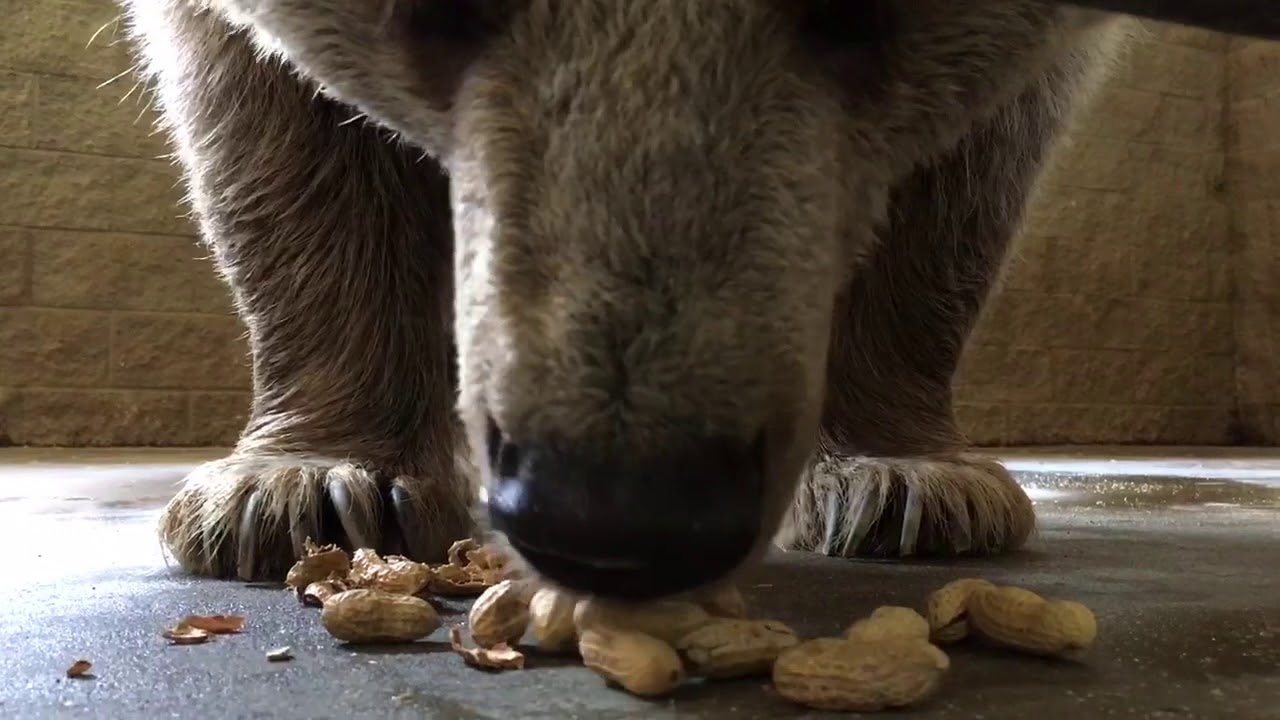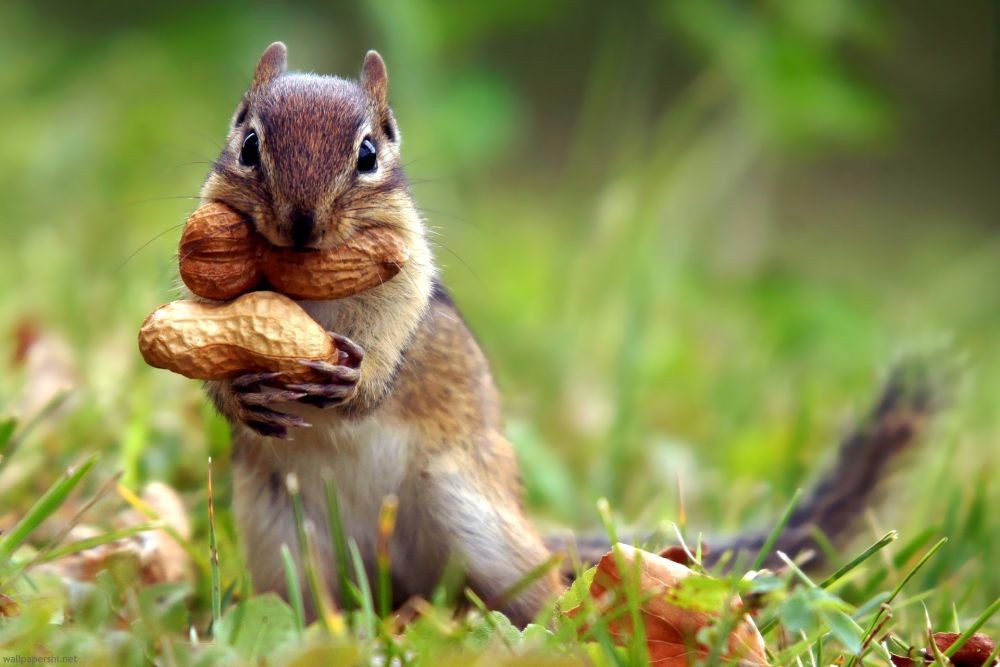What Animals Eat Peanuts? Fun Facts About Animals That Eat Peanuts
Learn what animals eat peanuts and fun facts about their peanut-eating habits. Discover which birds, mammals, and other animals love this delicious and nutritious snack.
Author:Maya ReyesReviewer:Sophia HarperJul 07, 202537.1K Shares662.6K Views

What animals eat peanuts? Yes, Peanuts are a popular snack for both humans and animals. They are a type of legume, which is a plant that produces seeds in pods. Peanuts are relatively high in protein, fat, and calories, making them a nutritious food for many animals.
There are a few reasons why peanuts are so popular with animals. First, they are a good source of energy. Peanuts are high in fat and calories, which gives animals the energy they need to run, jump, and play. Second, peanuts are relatively easy to find and digest. Peanuts grow in pods underground, which makes them easy for animals to dig up. They are also relatively soft and easy to chew. Finally, peanuts are a tasty treat for many animals. Peanuts have a sweet, nutty flavor that animals enjoy.
Peanuts can provide a number of benefits for animals. Peanuts are a good source of protein, which is essential for building and repairing muscle tissue. Peanuts are also a good source of fat, which is a source of energy and helps to keep animals warm. Peanuts are also a good source of calories, which are necessary for all animals to survive.
While peanuts can be a healthy snack for animals, there are a few risks to be aware of. First, peanuts can be a choking hazard for small animals. It is important to break peanuts into small pieces before giving them to small animals. Second, peanuts can be high in salt. It is important to avoid giving salted peanuts to animals, as too much salt can be harmful to their health. Finally, peanuts can be allergenic to some animals. If you are unsure whether or not your animal can eat peanuts, it is best to consult with a veterinarian.
Peanuts can be a healthy and nutritious snack for many animals. However, it is important to feed peanuts in moderation and to be aware of the risks associated with feeding peanuts to animals.
What Animals Eat Peanuts?
Here are detailed explanations of animals that commonly eat peanuts,
Birds
- Blue Jays -Blue jays are known for their affinity for peanuts. They have strong beaks that allow them to crack open peanut shells and access the nutritious nut inside.
- Cardinals -These brightly colored birds also enjoy peanuts. They are often found foraging for them in bird feeders or on the ground.
- Chickadees -Chickadees are small, lively birds that readily consume peanuts. They are known for their acrobatic feeding behavior.
- Crows -Crows are highly intelligent birds and are known to eat a wide variety of foods, including peanuts. They are often seen foraging for them in parks and gardens.
- Nuthatches -These birds have a unique feeding behavior where they can feed upside down or on vertical surfaces. They are known to relish peanuts, especially during colder months.
- Woodpeckers -Woodpeckers have strong, chisel-like beaks, which they use to drum on trees and extract insects. They also enjoy feeding on peanuts.
Mammals
- Squirrels -Squirrels are perhaps one of the most well-known consumers of peanuts. They are skilled at cracking open peanut shells and are often seen burying them for later consumption.
- Chipmunks -Similar to squirrels, chipmunks are small rodents that are fond of peanuts. They have cheek pouches that allow them to carry and store peanuts efficiently.
- Mice and Rats -Some species of mice and rats will also consume peanuts if they come across them. They are attracted to the high-fat content of peanuts.
- Primates -Certain primates, such as monkeys and apes, can eat peanuts. In captivity, they may be provided with peanuts as part of their diet, although it's important to offer them in moderation.
Other Animals
- Elephants -Elephants have been known to enjoy peanuts, and they can use their trunks to peel and consume them. However, it's important to note that peanuts are not a major part of their natural diet.
- Bears -Bears are omnivores and have a diverse diet that includes a wide range of foods. They have a particular fondness for peanuts and may go to great lengths to obtain them, even raiding bird feeders.
These animals have adapted to include peanuts as part of their diet, either naturally in the case of some birds, or through opportunistic foraging in the case of mammals. Providing peanuts for these creatures can offer supplemental nutrition, especially in environments where natural food sources may be limited. It's important to offer unsalted, unseasoned peanuts and to do so in moderation to ensure the animals' health and well-being.
Fun Facts About Animals That Eat Peanuts
Here are some fun and interesting facts about animals that eat peanuts,
- Blue Jays' Remarkable Memory -Blue jays are known for their exceptional memory skills. They have the ability to stash away an impressive 4,000 peanuts in various hiding spots, relying on their memory to retrieve them later. This helps them ensure a steady supply of food, especially during leaner times.
- Squirrel Storage Skills -Squirrels are notorious for their habit of burying food for later consumption. When it comes to peanuts, they take this behavior to an extreme. A single squirrel can bury and remember the locations of up to a staggering 100,000 peanuts! This elaborate caching system is a crucial survival strategy for them.
- Elephants and Peanut Peeling -Elephants are known for their dexterous trunks, which they use for a wide range of tasks. Surprisingly, they can even peel peanuts with their trunks! This demonstrates the incredible control and sensitivity they have over this versatile appendage.
- Bears' Love for Peanuts -Bears are generally omnivores, meaning they eat both plants and animals. While they have a diverse diet, they also have a strong affinity for peanuts. This fondness for peanuts is so great that bears have been known to raid bird feeders just to get their paws on these tasty treats. It's a testament to just how much they enjoy them!
These facts showcase the remarkable abilities and behaviors of these animals when it comes to dealing with peanuts. From memory skills to dexterity, it's clear that peanuts play a fascinating role in the lives of these creatures.
Here are some additional facts,
- Antics of Acrobat Squirrels -Squirrels are not only adept at storing peanuts, but they're also incredible acrobats. They can perform astonishing feats of agility, including leaps and bounds from tree to tree. This agility helps them navigate their environment and locate their hidden peanut caches.
- Peanuts as Enrichment for Elephants -In captivity, peanuts can be used as a form of enrichment for elephants. Providing them with whole, unshelled peanuts can stimulate their problem-solving abilities as they figure out how to access the tasty nut inside. This mental stimulation is important for the well-being of captive elephants.
- Variety in Bear Diets -While bears do enjoy peanuts, it's important to note that they have varied diets depending on their habitat and what's available. In the wild, bears consume a wide range of foods, including fruits, berries, nuts, and even small mammals. Peanuts, when available, are simply one of the many options on their menu.
- Role of Blue Jays in Seed Dispersal -Blue jays, by storing and sometimes forgetting about the peanuts they've hidden, inadvertently play a role in seed dispersal. When they fail to retrieve all of their hidden stash, they contribute to the spread of peanut plants, aiding in their propagation.
These fascinating facts demonstrate the diverse and unique ways in which different animals interact with peanuts. From their memory skills to their problem-solving abilities, peanuts play a surprisingly important role in the lives of these creatures.
Safely Feed Peanuts To Wild Animals
Offer Peanuts In A Safe Location
This means choosing a spot that is away from busy roads and predators. You may also want to consider placing the peanuts in a bird feeder or other container that will make them difficult for other animals to reach.
Do Not Overfeed Animals
Overfeeding can lead to obesity and other health problems. Instead, offer a small amount of peanuts at a time and remove any uneaten peanuts after a few days.
Remove Any Uneaten Peanuts After A Few Days
This will help to prevent the peanuts from molding or attracting pests.
Here are some additional tips for safely feeding peanuts to wild animals,
- Avoid giving animals salted or flavored peanuts. Salt and other flavorings can be harmful to animals' health.
- Break peanuts into small pieces before giving them to small animals. This will help to prevent choking.
- Be aware of the different types of peanuts that are available. Some types of peanuts, such as raw peanuts, can be harmful to animals. It is best to give animals roasted peanuts or peanuts that have been specially designed for animal consumption.
- If you are unsure whether or not a particular animal can eat peanuts, it is best to consult with a veterinarian.
By following these tips, you can help to ensure that wild animals are safe when eating peanuts.
Here are some additional tips for feeding peanuts to specific types of wild animals,
- Birds -Offer peanuts in a bird feeder or scatter them on the ground. You can also offer peanuts in a suet feeder.
- Squirrels -Place peanuts in a squirrel feeder or scatter them on the ground. You can also hide peanuts in trees or other places where squirrels are likely to find them.
- Chipmunks -Place peanuts in a chipmunk feeder or scatter them on the ground. You can also hide peanuts in rocks or other places where chipmunks are likely to find them.
- Mice and rats -Place peanuts in a mouse or rat feeder or scatter them on the ground. You can also hide peanuts in cracks and crevices where mice and rats are likely to find them.
- Elephants, bears, and wild pigs -Place peanuts in a safe location where these animals are likely to find them. You can also offer peanuts in a large container or feeder that is specifically designed for these animals.
It is important to note that feeding peanuts to wild animals can have both positive and negative impacts. On the one hand, peanuts can provide a valuable source of food for animals, especially during the winter months. On the other hand, overfeeding animals can lead to obesity and other health problems. It is also important to be aware that feeding animals can make them more dependent on humans and less likely to forage for food on their own.
It is important to weigh the pros and cons of feeding peanuts to wild animals before making a decision. If you do decide to feed peanuts to wild animals, be sure to do so in a safe and responsible manner.
The Benefits Of Peanuts For Animals
Here are detailed benefits of peanuts for animals,
- Nutrient-Rich Food Source- Peanuts are packed with essential nutrients. They are a good source of protein, which is crucial for muscle development, repair, and overall growth in animals.
- Rich in Healthy Fats - Peanuts are high in healthy monounsaturated and polyunsaturated fats. These fats are essential for energy production and play a role in maintaining healthy skin and coat.
- Calorie-Dense - Due to their high fat content, peanuts are calorie-dense. This provides animals with a concentrated source of energy, which is particularly important for species that have high energy demands, such as birds and mammals.
- Vitamin and Mineral Content - Peanuts contain various vitamins and minerals that are beneficial for animal health. These include vitamin E, B vitamins (such as niacin and folate), magnesium, phosphorus, and potassium, among others.
- Digestibility - Peanuts are relatively easy to digest for many animals. This means that they can efficiently extract and absorb the nutrients from peanuts, making it a valuable food source.
- Readily Available - Peanuts are widely available in many regions, making them a convenient and accessible food option for animals. This availability ensures that animals can find food even in urban or disturbed habitats.
- Diversity of Wildlife Beneficiaries - Many species can benefit from peanuts, ranging from birds like blue jays and woodpeckers to mammals like squirrels, chipmunks, and even larger animals like bears. This diversity of beneficiaries highlights the versatility of peanuts as a supplemental food source.
- Supports Survival During Scarcity - During seasons when natural food sources may be scarce, providing peanuts can be a lifeline for wildlife. It helps them bridge the gap until their preferred natural foods become available again.
- Helps in Wildlife Rehabilitation - Peanuts can be a valuable component of the diet for animals in rehabilitation centers. They provide a reliable source of nutrition to aid in the recovery and rehabilitation process.
- Contributes to Wildlife Observation and Study - For wildlife enthusiasts and researchers, offering peanuts can be a way to attract and observe various species up close, providing valuable insights into their behavior and ecology.
Peanuts offer a valuable and nutritious food source for a wide range of animals, contributing to their health, energy, and survival in various habitats. It's important to ensure that peanuts are provided responsibly and in a manner that complements the animals' natural diets and behaviors.
(What Animals Eat Peanuts) _____ FAQs
Which Animal Likes To Eat Nuts?
Three different types of animals exist: herbivores, omnivores, and carnivores. Herbivores are animals that eat only plants. Carnivores are animals that eat only meat. Omnivores are animals that eat both plants and meat.
Do Any Animals Eat Peanut Shells?
Peanut hulls are also fed to livestock, particularly ruminants and rabbits, although their high fibre content does not make them suitable for most monogastric species.
What Is Elephant Favorite Food?
Elephants consume grasses, small plants, bushes, fruit, twigs, tree bark, and roots. Tree bark is a favorite food source for elephants. It contains calcium and roughage, which aids digestion. Tusks are used to carve into the trunk and tear off strips of bark.
Conclusion
What animals eat peanuts? Yes, Peanuts are a popular food for many animals, including birds, mammals, and other animals. They are a good source of protein, fat, and calories, making them a nutritious food for many animals. Peanuts are also relatively easy to find and digest.
When feeding peanuts to wild animals, it is important to do so in a safe and responsible manner. Offer peanuts in a safe location, do not overfeed animals, and remove any uneaten peanuts after a few days. Avoid giving animals salted or flavored peanuts, and break peanuts into small pieces before giving them to small animals.
Overall, peanuts can be a healthy and nutritious snack for many animals. However, it is important to be aware of the risks associated with feeding peanuts to animals and to feed peanuts in moderation.

Maya Reyes
Author
Maya Reyes’s wanderlust was sparked in the temples of Luang Prabang, where the scent of lemongrass and the chants of monks revealed the transformative power of travel.
Since then, her journey has been defined by cultural immersion and authentic connections. From learning batik in Indonesia to sharing meals with nomadic families in Mongolia, Maya seeks experiences that highlight the human stories behind each destination.
Travel for her is a way to weave her narrative into the world’s cultural tapestry, creating bridges across diverse ways of life. Maya has traveled to 15 countries and shares her insights through writing and storytelling.

Sophia Harper
Reviewer
Sophia Harper’s photography acts as a portal to the soul of the places she visits. Drawn to South America’s landscapes and cultures, she has spent years capturing everything from the majesty of ancient ruins to the vibrancy of urban streets.
Sophia’s work isn’t just about documenting moments; it’s about evoking the emotions and stories behind them. A dedicated photographer, she has worked with local communities across South America to capture their rich cultural narratives through her lens.
Latest Articles
Popular Articles

